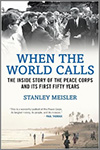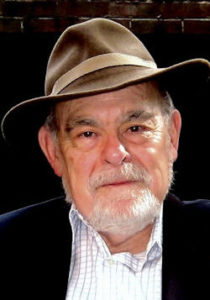Peace Corps Evaluator Stan Meisler Dies at 85
Stanley Meisler, globe-trotting foreign correspondent, dies at 85
Stan Meisler was an early evaluator in Charlie Peters’ legendary Peace Corps Office of Evaluation. He did several evaluations for the agency in Ethiopia, where we first met. In 1969, five years after we had met, when I was traveling through Africa writing for the Dispatch News Service, I arrived in Kenya and was walking through a park in Nairobi at midday and spotted Stan. Seeing me, and without breaking step, Stan said, “John, how are you? How about lunch?” That was the way (then and now) Peace Corps people respond to each other. They are never surprised at seeing anyone anywhere in the Third World.
 Several years ago, Meisler wrote the most recent comprehensive book on the agency entitled, When The World Calls: The Inside Story of the Peace Corps and Its First Fifty Years. Meisler, one of the early Peace Corps “Mad Men” brought to the agency a fresh way to look at developing in the world, and told the story of what PCVs were doing around the world in reports that verged on literature. A great believer in what the Peace Corps was trying to do, he spent his days at the agency trying to make sure we PCVs were doing the best we could. A first rate foreign correspondent. A first rate human being. A first rate writer: Stan Meiser. They don’t come any better. — J.C.
Several years ago, Meisler wrote the most recent comprehensive book on the agency entitled, When The World Calls: The Inside Story of the Peace Corps and Its First Fifty Years. Meisler, one of the early Peace Corps “Mad Men” brought to the agency a fresh way to look at developing in the world, and told the story of what PCVs were doing around the world in reports that verged on literature. A great believer in what the Peace Corps was trying to do, he spent his days at the agency trying to make sure we PCVs were doing the best we could. A first rate foreign correspondent. A first rate human being. A first rate writer: Stan Meiser. They don’t come any better. — J.C.
There will be a service for Meisler on July 9, 2-5 pm at the National Press Club in Washington.
•
The following obituary is by Emily Langer a reporter on The Washington Post. It is in today’s newspaper.
Stanley Meisler, a reporter who chronicled foreign affairs in posts from Nairobi to the United Nations for the Los Angeles Times, and who later turned his journalistic curiosity to the history of 20th-century art, died June 26 at a hospital in Washington. He was 85.
The cause was cardiac arrest, said his son Joshua Meisler.
Mr. Meisler crisscrossed the globe during his three-decade career with the Times. He joined the newspaper’s Nairobi bureau in 1967 and traveled widely for his work, covering the bloody Nigerian civil war over the breakaway Biafra region and the reign of Emperor Haile Selassie of Ethiopia.
He was the “doyen of the press corps” in the region, Jim Hoagland, a former Africa correspondent and foreign editor for The Washington Post, said in an interview. “He really understood human nature, and he applied that in covering a continent that too frequently had been reduced to the cannibalism and coup d’etat syndrome.”
The Times later sent Mr. Meisler to Mexico City, Madrid, Toronto, Paris and Barcelona. Among the pleasures in the life of a foreign correspondent, he once observed, was the opportunity to research and write “little Ph.D. theses” on cultural curiosities.
One such curiosity he observed in Madrid shortly after the 1975 death of Francisco Franco, the fascist leader of Spain for nearly four decades. In an article published years later in the Times, Mr. Meisler recalled a screening of Charlie Chaplin’s 1940 political satire “The Great Dictator.” During the Franco regime, he explained, “no one had ever been foolish enough to show it.”
The Spanish moviegoers “laughed uproariously at Chaplin’s slapstick antics exposing the pretensions of dictatorship while playing the Hitler-like character Hynkel,” Mr. Meisler recalled.
“At the end, when the little Jewish barber . . ., also played by Chaplin, made an eloquent plea for peace and brotherhood and democracy, the audience around me stood up and broke into fervent applause. It was a shivering, emotional moment.”
Mr. Meisler continued: “That evening in the movie theater hallways served as a kind of metaphor for Spain at that moment in history. Not only did it demonstrate the enormous will of Spaniards for change, but the spirited laughter at old jokes, from a movie shelved for almost four decades, underscored how isolated Spain seemed in those days.”
In the late 1980s, Mr. Meisler returned to the United States and reported from Washington and New York before his retirement in 1998. His coverage of the United Nations helped inform his first book, “United Nations: The First Fifty Years” (1995). He later wrote “Kofi Annan: A Man of Peace in a World of War” (2007), a biography of the Ghanaian diplomat and Nobel Peace Prize laureate who was U.N. secretary-general from 1997 to 2006.
After Mr. Meisler retired, he dedicated himself to a lifelong interest in art. He contributed works of art history and criticism to publications including the Times and Smithsonian Magazine.
His last book, “Shocking Paris: Soutine, Chagall and the Outsiders of Montparnasse” (2015), focused on artists from the Russian empire, most of them Jewish, who made an often uneasy home in the French capital in the early 20th century. Mr. Meisler was a distant cousin by marriage of Chaïm Soutine, a noted expressionist of the time.
Unable to leave German-occupied France during World War II, Soutine dodged roundups while nursing debilitating ulcers that forced him to survive on milk. He died in 1943 at age 50 after a surgery.
Mr. Meisler traced his interest in Soutine to an uncle, who warned Mr. Meisler not to become an artist, lest he consign himself to a life of struggle. Mr. Meisler quipped that his uncle’s admonition, contrary to its intended purpose, inspired his fascination.
Stanley Meisler was born in the Bronx on May 14, 1931. His father, a paper hanger, was a Jewish immigrant from Eastern Europe.
In 1952, Mr. Meisler received a bachelor’s degree in English from the City College of New York. Before joining the Times, he spent a decade with the Associated Press wire service and was a Peace Corps administrator. He was the author of “When the World Calls: The Inside Story of the Peace Corps and Its First Fifty Years” (2011).
His marriages to Gloria Greenwood and Susan Mitchell ended in divorce. A daughter from his first marriage, Sarah Meisler, died in 1976.
Survivors include his wife of 32 years, Elizabeth Fox of Washington; two sons from his first marriage, Joshua Meisler of Fontainebleau, France, and Sam Meisler of Knoxville, Tenn.; two stepchildren from his second marriage whom he adopted, Michael Mitchell of Victoria, British Columbia, and Michèle Meisler of Sointula, British Columbia; two stepchildren from Fox, Gabriel Cardona-Fox of Geneva, Switzerland, and Jenaro Cardona-Fox of Cohasset, Mass.; and 12 grandchildren.
In his career as a foreign correspondent, Mr. Meisler at times faced unusual obstacles in his work. They included, while reporting from Kinshasa in the 1960s, outsmarting the Congolese security chief who required that all dispatches transmitted over telex machines be written in French — the language understood by censors.
Mr. Meisler did not speak French.
“After much thought, I concocted a new language of my own in which all the nouns were in French and all the verbs in English,” he wrote in the Times in 1998. “I would write and send by telex sentences like these: ‘Les mercenaires are shooting up le congo aujourd’hui.’
“My concoction worked. The Congolese censors were satisfied with my French, and the foreign desk figured out more or less what I was trying to say.”
He did not, however, achieve this feat without some grief from colleagues back home.
“I could not reach the office by phone and could only hint in my telex messages what was going on,” he recalled. “For a week I received sarcastic cables from Los Angeles congratulating me on my incredible grasp of the nuances of the French language.”

Too soon gone, as all good men are. Just this week, I used ” When the world calls” to better understand what happened in the Dominican Republic in 1965. When Stanley Meisler published this book about Peace Corps , he also published his email address and encouraged RPCVs to write him with questions and comments. My niece was working to help the transition to the new Whitney Art Museum and I sent her Meisler’s book, “Shocking Paris.” He will be missed.
Stanley was a guest speaker at one event that RPCVs at HUD (plus other Federal agencies in DC) sponsored during our 7 month-long commemoration of the Peace Corps’ 50th Anniversary. He was pure Stanley, affable as always, as he spoke affectionately about those he knew in those good ol’ days of the agency.
Later, at a 50th Anniversary gala event in the Smithsonian’s Buildings Museum, a book fair involved Peace Corps writers. My table was 9 or 10 feet from Stanley’s. Folks often crowded his table where he must’ve sold 100 or more copies of his book about the Peace Corps; I came away selling three.
This summer, a study of the United Nations Association of the USA will be released. As a contributor, I can’t review it, so I had intended to ask Stanley to do so. Too bad the book hadn’t appeared a year ago (as had once been hoped) during the United Nations 70th Anniversary. An authority on the U.N., he could have reviewed it then.
Anyway, I hope to see some of his RPCV admirers from among you at the National Press Club service, July 9th.